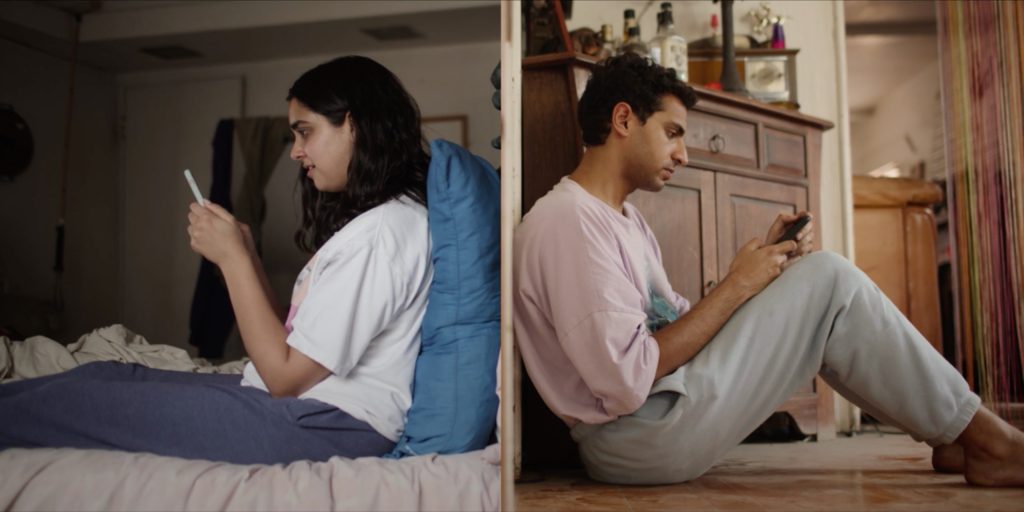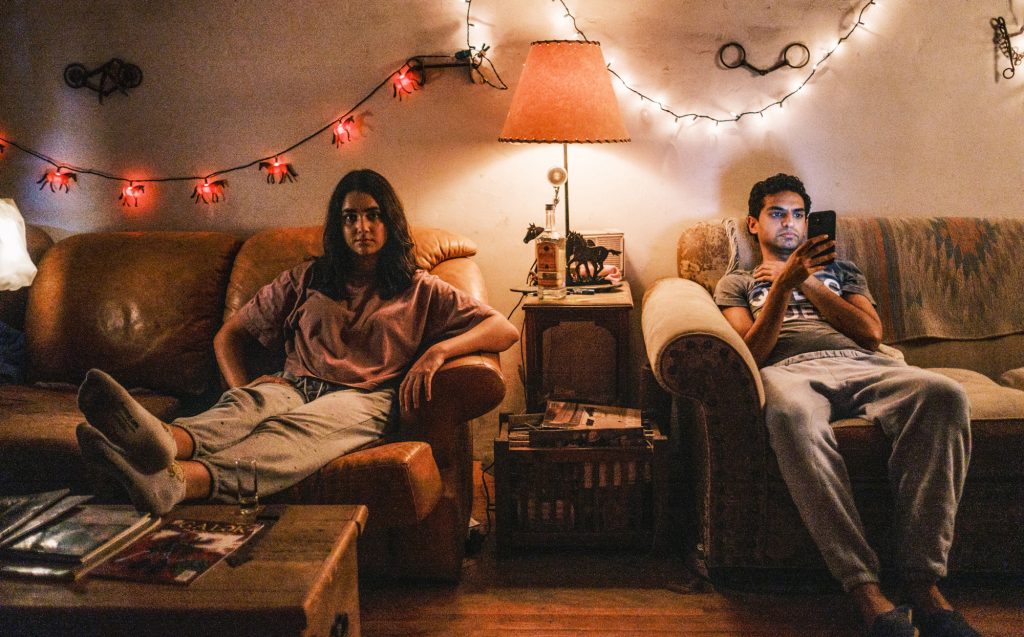When 7 Days won Best First Feature at the Film Independent Spirit Awards earlier this month, co-writer and co-star Karan Soni (Deadpool, Miracle Workers) was very surprised. And very drunk.
“I was like, ‘we’re not winning,’ so why am I pretending like I’m not going to be drinking this whiskey that’s on the table?”
He laughs, along with director and co-writer Roshan Sethi, who is next to him. “We were just really delighted and, frankly, surprised to win. It was really a huge honor for a movie that was made so modestly––I think, by far, the cheapest movie at the awards show.”
That is an ongoing theme when talking about 7 Days, a pandemic-set romcom following two Indian singles, portrayed by Soni and co-star Geraldine Viswanathan (Bad Education, Blockers), who are forced to shelter-in-place together after an awkward first date. It’s fitting that, as the title suggests, the film takes place over seven days, because it was actually shot in just eight days.
Production took place in September of 2020, so the exorbitant costs of COVID testing meant that the film had to be shot as quickly as possible. Sethi and Soni would shoot up to 17 pages a day, often only getting fifteen minutes to light a scene and one, maybe two, takes to get it right.
It also had to be made with as few people as possible. The film was shot with a mighty crew of just eleven people, but the sped up production schedule brought out everyone’s creative energy. It made for a strong family dynamic on set that kept everyone connected and motivated during completely unprecedented times.
“I feel really grateful that Film Independent is recognizing movies that are made with such a scrappy, indie spirit, because those are increasingly hard to make,” notes Sethi. “I think, unless they get rewarded in some ways, that pipeline will stop.”
Well, rewarded they were. After bouncing around the 2021 festival circuit, with stops at Tribeca and BFI, Cinedigm acquired distribution rights for this little indie that could. The film is set to release in theaters this weekend.
“We’re so excited for, really, everyone to get to see this movie now,” says Soni. “It’s been doing a lot of festivals and all that, but we have a lot of friends and family that are like, ‘how can I watch this movie?’ and it’s like, ‘Well, now you can.’”
With that excitement brewing, I sat down with Sethi and Soni to hear more about the film’s production process and how they overcame a variety of on-set challenges.
The following interview has been edited for length and clarity.

Larry: This film was made at such a small budget and during such unprecedented times, but I think most creatives will agree that sometimes constraints can bring out the best creativity from everybody involved. Was there a time while you were making this film that you had a budgetary obstacle, or maybe even a COVID-related obstacle, and you guys ended up finding a way to overcome that with your limited resources?
Roshan: I think the whole movie came out of this really crazy constraint, which is ‘how do you make a movie during COVID for very, very cheap?’ which meant having as few actors as possible––in this case, only two, with everybody else on the phone or as a voice––and then shooting it as quickly as possible. COVID testing in September of 2020 was so expensive that we needed to reduce the number of days, because if we had had 20 days to make the movie, the COVID cost would have been twice as much, if not more so. And then we had to limit the number of people that were physically present. The upside of all of that was that we made the movie in such a spirit of generosity and family because we were all together, united under these crazy circumstances, and I think some of that Goodwill did spill over into the movie.
Karan: Yeah, I agree. The crew has not really worked since March of 2020. It was their first time back on a set and, on smaller movies like this, often the crew has to do three jobs other than their own. There was definitely this sense of like, ‘oh my gosh, remember this thing that we haven’t been able to do for six months that we love,’ that really was infused in the movie. No one was jaded yet.
Roshan: Sometimes sets don’t feel like a creative space because they’re so tedious and you have to be so meticulous, but this always felt like a creative space because we never really had more than one or two takes. We did not have time to do extraordinarily long lighting setups. We were lighting most setups in 15 minutes, if not less. So we were moving so fast, but it was always fun and interesting. It was like watching live theater when [Karan and Geraldine] were acting. We weren’t doing the more typical thing on film and TV sets where you’re performing the same scene for hours. This was not like that.

Larry: Speaking of the lighting, something that really struck me about this film was that, for a film that is largely single-location, the house really feels like it has this multifaceted look that’s really informing the story. Roshan, I would love to hear some insight about your relationship with director of photography Jeremy Mackie and how you guys worked to make the house feel more dynamic than a single location would normally be.
Roshan: Well, first of all, the three of us really worked on it: me, Karan, and Jeremy Mackie, who is extremely talented and has been in the Duplass family for a long time. He’s a former camera operator and then he moved into becoming a gaffer, but this was really his first full length narrative feature as a DP and he did an extraordinary job as you saw. In terms of figuring out ways to make the background seem lively, the first is that we spent a lot of time in pre-production taking photo boards of the ways that we would shoot every scene. We didn’t explicitly refer to them when we were making the actual movie, but we had them at the back of our mind and all of that work that we had done before paid off in less explicit ways than you might imagine. Second of all, we block-scheduled [the shoot] by room. We shot every living room scene all at once, and then we shot every bedroom scene, and then we shot every kitchen scene, and then we shot every dining room scene. We were so conscious as we shot each scene [in the living room] of the way in which we had just shot the living room, and that helped us make it more lively. We, more or less, just used different walls for different scenes, but it was a bit more complicated than that. Jeremy came early and pre-rigged the entire house along with his gaffer, Camilo Godoy. It was a little bit like entering a stage in that sense, because it was so pre-rigged and they had absolute control of every light source and sheer. We also shot day for night, which helped a lot in terms of the schedule. That was just trash bags over the windows. We had a lot of night scenes, actually, more than you might expect. It helped us control the lighting because that’s obviously harder with daytime scenes.
Karan: I think the location too, in many ways, was so unique. Our producer, Liz [Cardenas], ended up finding this crazy location. We shot on a horse ranch in Palm Springs in this crazy home. We were really struggling with the location, everything sort of looked a little simple, and then we found this ranch. Everywhere you looked, you were like, ‘oh my gosh…there’s a lot going on in this house…’”
Roshan: There wasn’t a boring view of any room in that house because there was so much going on. She had accumulated an entire lifetime of horse paraphernalia. The Fenton twins [Ashley Fenton and Megan Fenton], who were the production designers, were very good about augmenting what was there with the horse lights that they strung up and the colored sheers. They fit within this space rather than trying to reinvent something new.

Larry: Last question! You know, we’re in a really crazy award season right now, and I always like to hear what other people are watching. Is there anything that you’ve seen from awards season this year that’s inspired you?
Roshan: For the movies this year, I really liked The Power of the Dog and The Lost Daughter. They were both really interesting and have still stuck with me. And then I just saw The Worst Person in the World, which is also really good.
Karan: I loved Don’t Look Up, which I feel like…I just don’t understand why it didn’t get more love. [Climate change] is a huge issue that we’re all going through and no one wants to talk about it. What a unique way to talk about it. I thought the acting was amazing. I also loved In The Heights, which I also feel like not enough people are talking about. I thought it was so good.
Larry: Thank you so much for your time, guys! If it were up to me, “Desi Spider-Man” [an original song featured in the film] would be a Best Original Song contender right now.
Karan: [laughs]
Roshan: Yeah!
Larry: But you had some tight competition––you know, Beyonce and Lin-Manuel Miranda or whatever…
Roshan: Yeah, good people.
Larry: I really enjoyed this film, I’m really excited for other people to get to see it, and I thank you so much for your time. It was so great to talk to you!
Karan: Thank you so much.
Roshan: Thank you.
A Cinedigm release, “7 Days” will have a limited theatrical release beginning Friday, March 25th, with a virtual release scheduled for April.

Larry Fried is a filmmaker, writer, and podcaster based in New Jersey. He is the host and creator of the podcast “My Favorite Movie is…,” a podcast dedicated to helping filmmakers make somebody’s next favorite movie. He is also the Visual Content Manager for Special Olympics New Jersey, an organization dedicated to competition and training opportunities for athletes with intellectual disabilities across the Garden State.







